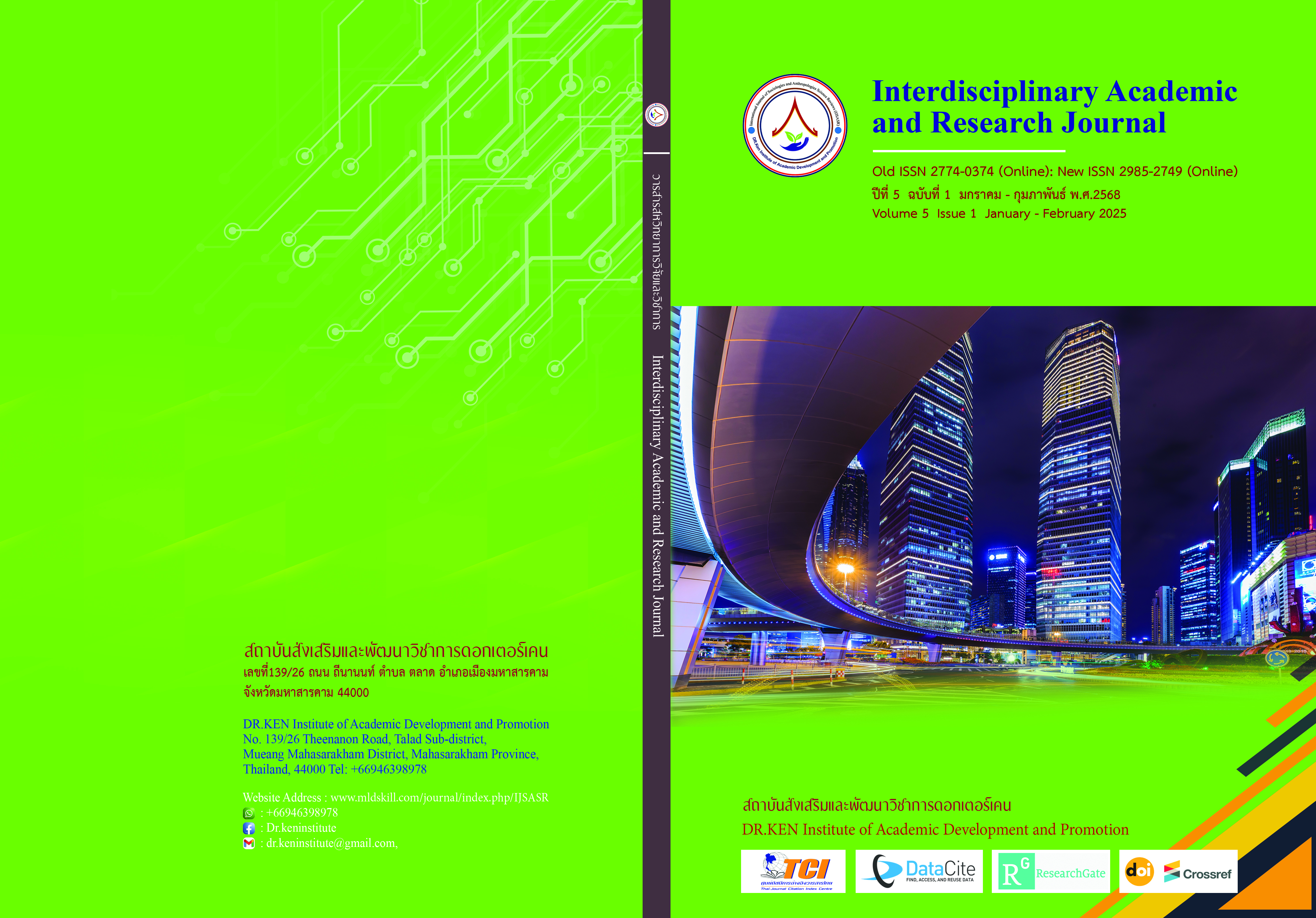Community Waste Management in Nong Chok District, Bangkok
DOI:
https://doi.org/10.60027/iarj.2025.279871Keywords:
Waste, Management, CommunityAbstract
Background and Aims: Effective community waste management reduces pollution in the environment and improves public health by recycling and appropriately disposing of waste. It also promotes community accountability for maintaining sustainability and a clean, healthy environment. The objective is to qualitatively research the operational model for the Baomai waste management group in the eastern Bangkok area.
Methodology: Waste management is applied to manage in the community in the form of integrated waste management and management is carried out following the dimensions of each community. This is done with the help of the award-winning prototype community Khoi Ruddin and the pilot community, as well as by inviting a sample group of five communities as research tools, attending seminars, conducting interviews, and gathering data from all five communities.
Results: It was found that it is truly a pilot project for other communities, a practical tool that can be used in large-scale studies related to waste, adjusted to create dimensions in each community. In addition, it was found that the issue of waste management by creating a culture of environmental conservation in the community and the relationship between garbage and the environment and people.
Conclusion: Creating a culture of cleanliness in the community that has an impact on the environment and eliminating abnormal waste is a problem. The application of the model communities resulted in all five communities creating value and expanding the results to create efficiency in managing other communities in the future.
References
น้ำเพชร ฉันทะวิบูลย์ และ อรทัย ก๊กผล. (2016). การบริหารจัดการนโยบายการลดปริมาณมูลฝอยของกรุงเทพมหานคร (No. 89605). มหาวิทยาลัยธรรมศาสตร์.
พระมหากฤษธิชัย กิตฺติธมฺโม. (2567). การจัดการขยะปลอดขยะ (Zero Waste) แนวทางเพื่อสิ่งแวดล้อมยั่งยืน.วารสารพุทธนวัตกรรมและการจัดการ, 7 (2), 231-243.
สำนักงาน คณะกรรมการอิสลามประจำกรุงเทพมหานคร. (2565). ระบบบริหารจัดการข้อมูลมุสลิม. สำนักงานคณะกรรมการอิสลามประจำกรุงเทพมหานคร. Retrieved from: https://masjid.islamicbangkok.or.th/
สิริกร นามลาบุตร, ศุภมา ศปุณ ประเสริฐ, จันทม รสี หาบุญลี, พีรวิชญ์ นามลาบุตร, & พฤภา หอมยก. (2565).การศึกษาแนวทางการลดปริมาณขยะมูลฝอยในชุมชนเพื่อสุขภาวะของประชาชนในเทศบาลตำบลโพนพิสัย. มจร.เลยปริทัศน์, 3 (2), 34-43.
Charoentrakulpeeti, W., & Mahawan, N. (2019). The Impact Assessment of Climate Changes Toward People’s Healthy in Bangkok Metropolis. Journal of The Faculty of Architecture King Mongkut's Institute of Technology Ladkrabang, 28 (1), 1-20.
Collins, L. (1996). Recycling and the Environmental Debate: A Question of Social Conscience or Scientific Reason? Journal of Environmental Planning and Management, 39 (3), 333– 356. https://doi.org/10.1080/09640569612453
Ilham, A., Rahman, M., & Sumar, W. T. (2022). Community Empowerment Through Waste Management With Reduce, Reuse and Recycle System (3r) In Bulota Village. Devotion: Journal of Research and Community Service, 3 (4), 353-360.
Kumar, A., Mittal, R. K., & Goel, R. (Eds.). (2023). Waste Recovery and Management: An Approach Toward Sustainable Development Goals. CRC Press.
Kurniawan, T. A., Meidiana, C., Othman, M. H. D., Goh, H. H., & Chew, K. W. (2023). Strengthening waste recycling industry in Malang (Indonesia) : Lessons from waste management in the era of Industry 4.0. Journal of Cleaner Production, 382, 135296.
Nanda, S., & Berruti, F. (2021). Municipal solid waste management and landfilling technologies: a review. Environmental chemistry letters, 19 (2), 1433-1456.
Ontes, P. (2020). Evaluation and development of waste minimization system in Bangkok. Retrieved from: https://repository.nida.ac.th/handle/662723737/5176.
Downloads
Published
How to Cite
Issue
Section
License
Copyright (c) 2025 Interdisciplinary Academic and Research Journal

This work is licensed under a Creative Commons Attribution-NonCommercial-NoDerivatives 4.0 International License.
Copyright on any article in the Interdisciplinary Academic and Research Journal is retained by the author(s) under the under the Creative Commons Attribution-NonCommercial-NoDerivatives 4.0 International License. Permission to use text, content, images, etc. of publication. Any user to read, download, copy, distribute, print, search, or link to the full texts of articles, crawl them for indexing, pass them as data to software, or use them for any other lawful purpose. But do not use it for commercial use or with the intent to benefit any business.
















.png)


